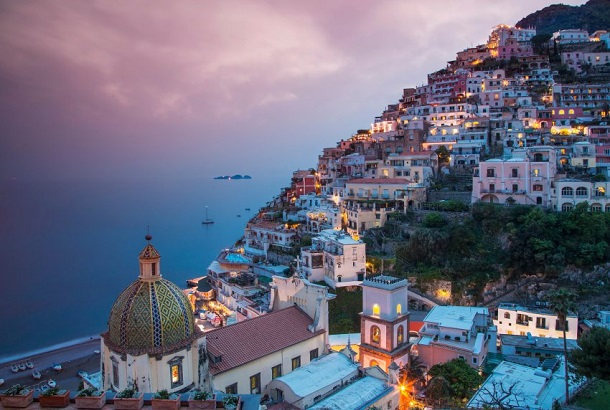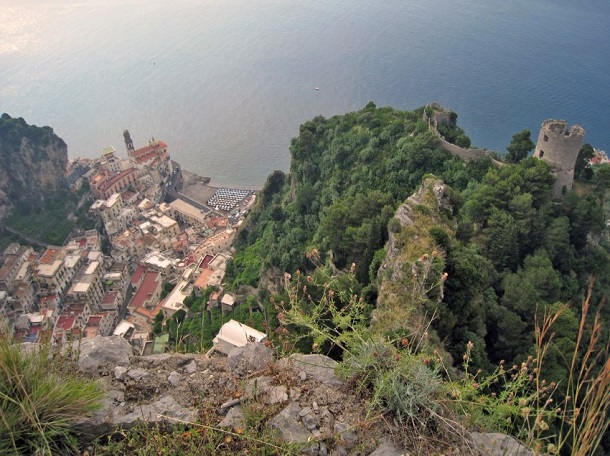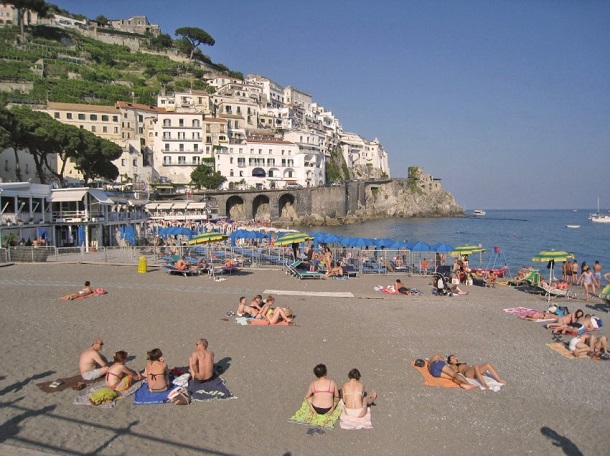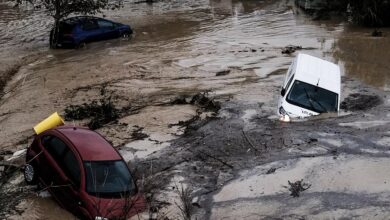To Assumption flows throughout Italy by the sea. Even the streets of the towns on the Amalfi coast are flooded with cars and tourists. But the hinterland! There will meet hikers only on lemon carrier, mules and refreshing waterfalls.
Gennaro Pisacane makes no Assumption pilgrimage. He flees. For the 15 Although August is one of the most important holidays in Italy, but especially ferragosto is the highlight of the summer holiday season. Andiamo al mare, decide the Italians. We go to the sea, to the sea!
At almost all sandy beaches and rocky coves umbrellas are fixed, inflated crocodiles, eats from cooler bags panini and lasagna. Who is even moderately in consolation, should spend the day in the cool behind closed shutters.
But Italy is not working. If all go to the sea, no one wants to stay home. And those who really do not go to the beach, flooding the streets of picturesque villages. Such as Amalfi.
If stroll along the Corso on Japanese women with cap, cruise ship passengers and also all the Italian Cup before with huge lemons, then goes Pisacane with his three young daughters in the steep valley behind Amalfi.
There he sits in the cool river, the cliffs rise vertically so on, like the walls of his home town. Just can not hear anything here except for the lapping of the water and the Juchzern the girls. The sun’s rays leave the rock walls light up green, ferns spread their leaves, and water drips everywhere, thrown around in waterfalls, rushing sometimes enormous.
Anti-stress Hiking in the hinterland
Gennaro Pisacane, 45 years old, lawyer, owner, president of the Hotel Association, often comes here. He is an avid hiker. And he is not referring to what his compatriots interpret this drive to a parking lot and walk to the picnic basket next to the tree. “I go almost every morning in the mountains,” says Pisacane.
At 7 clock he takes off, and it always goes straight up steep, so that’s just on the Amalfi Coast. The power conferred on the work of many hoteliers. Because Amalfi is always full to overflowing in the summer. For decades, tourists flock here, oh what, for centuries. The Amalfi Coast is the “most pleasant area in Italy,” wrote before the mid-14th Century Giovanni Boccaccio in the “Decameron”.
The hoteliers would also like to extend the season, says Pisacane. For hikers it is also in low season “fantastic”. He runs to the Torre dello Ziro, a tower dating from the Middle Ages up. On the ancient stairs the harvest was brought from the hills to the sea. That sounds like the distant past, until you hear hoofbeats. The steep path down a man leads two mules by the bridle. They are piled high.
On the steep slopes of the coast there simply is no other way to transport loads between Amalfi and seaside villages, says Pisacane. Only one more: In pontoons, a man, a sort of turban wrapped around his head, the cloth forms a bulge in the neck. Then he heaves a plastic box on its head, brimming with lemon, covered with an old tablecloth. How much weigh that asks Pisacane. 60 kg responds the man, waving his free hand and walks briskly up some stairs to the street.
Europeans no longer come because of the room
On the Piazzetta of pontoons, a village with 700 inhabitants, sitting in front of the bar an Austrian couple with a small backpack. Five days of trekking they have behind them, after they fill their water bottles at the village well. At the next table talk two British women who look like from a Jane Austen adaptation: reddish hair, fluttering bright summer dresses, big sun hats. You live with friends in Ravello.
How to live really, when the village streets are always clogged with people? Gennaro Pisacane says Amalfi have 2000 guests 5000 beds to population, “still a very good relationship. Added What us, the days are tourists.” To regulate this, they have increased the fees for bus parking. The first hour costs 75 euros, the second is cheaper, third free. “So that the organizers plan a lunch and we deserve something about it.”
The crisis in Europe would be caught by guests from afar. “With the Chinese, we get along well,” says Pisacane. “The Chinese is so similar to the Italians. The mentality is virtually identical.” They put a lot of emphasis on family, be relaxed, not very punctual.
Japanese, however, are complicated. “We compare it with the Germans.” And what they say about the Germans? “We have given up, the Germans do not come any more,” says the owner. German travelers make only a share of two percent. “The count exactly our room they are too expensive.”
From the tower he looks over to Ravello. The place where the lodge British women, perched on a rocky plateau. Richard Wagner composed here, here you can pay 4000 euros for one night. As before, all the hotels were locals. “If someone is selling, we try to make it as a buy from here. We do not want money from Naples.” The only 60 kilometers away, Naples is synonymous with the Mafia and Camorra. Amalfi Neapolitan donors would want to fund a marina. “We have rejected.”
Lemons against the crisis
In an arc, it goes back to Amalfi, down by lemon trees. Depend heavily on wood frames the bright fruits, behind the glistening sea – does not go more south. The suspension runs through a system of channels. For the rock terraces were smashed and small planes filled up with earth. Besides the inflow and drainage was important that the water is not dammed, “because otherwise it tears down the walls again with power.”
But the lemons really come in souvenir shops from here? Yes, says Pisacane, but the farmers deserved bad. “They sell for 50 cents a kilo at the stores. During the eighties they have to get it 500 lire still basically the same price.” Because of the economic crisis, the Italians even remember back to work in the citrus groves, even if it’s hard.
On the opposite slope to a vertical water pipe to the valley, the first power station in Amalfi. The water flowed partly through open channels. When the lights went out in the city, because the power went out, Pisacanes grandmother always said in the dialect of Campania: “È a good fronn ind ó canal ‘- leaves clog the channel.
In order to become master of the cars that clog the Amalfi coast road, there is a new plan: a tunnel is to carry through the mountains behind Amalfi, passing among the villages of the hinterland. Access to the site would then lead through that valley, the Pisacane like to wander through. “I can not make friends easily with the idea,” says Pisacane. But just as he was building to the crisis: “But no money is already there, who should fund something?”
[adrotate banner=”27″]






